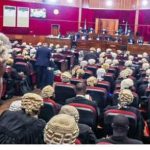Streamlining Witnesses: Atiku and PDP’s Strategy Revealed in Presidential Election Petitions Tribunal
In the aftermath of the February 25 election, the Peoples Democratic Party (PDP) and its presidential candidate, Atiku Abubakar, have taken their challenge to the Presidential Election Petitions Tribunal (PEPT). With the aim of presenting a strong case against President-elect Bola Tinubu of the All Progressives Congress (APC), the PDP and Atiku have disclosed their plans to call a limited number of witnesses during the proceedings.
Agreement on Witness Numbers and Duration:
Addressing the court in Abuja, Chris Uche, the counsel for Atiku and the PDP, revealed that all parties involved had engaged in discussions and reached a consensus regarding the number of witnesses to be called and the duration allocated to each party. This cooperative decision was made to streamline the trial process and ensure efficiency.
Reduced Timeline:
As the issues at hand began to narrow down, Uche mentioned that even though they were given seven weeks to call witnesses, they anticipated requiring only three weeks. This shortened timeframe reflects the increasingly focused nature of the case and the need to expedite proceedings.
Categorization of Witness Time Slots:
To further streamline the process, the parties categorized the time allotted for different stages of witness examination. The lead witness was granted 30 minutes for the presentation and identification of crucial documents. Cross-examination of each respondent was limited to 15 minutes, while five minutes were allocated for re-examination of the petitioners’ lead witness. Other witnesses from the petitioners were given 10 minutes for their testimony and an additional 10 minutes for cross-examination by the respondents.
Time Allocation for Star Witnesses:
Notably, the respondents, which include the Independent National Electoral Commission (INEC), Tinubu, and the APC, proposed a 30-minute time slot for their star witnesses. Cross-examination of these witnesses by the respondents was also set at 30 minutes.
Witness Numbers:
INEC stated that it would present two witnesses, while the counsel for President-elect Tinubu confirmed that they were prepared with 39 witnesses. In order to maintain transparency, it was agreed that the report of any star witness presented by the respondents should be made available to all parties 48 hours prior to the hearing.
Procedural Requirements:
To ensure a fair trial, the parties agreed that the schedule of documents to be filed must be provided to all involved parties before the hearing and the calling of witnesses. Additionally, the examination of experts or star witnesses was allocated 20 minutes, while respondents were given 30 minutes for cross-examination. Re-examination, aimed at clarifying any issues, was scheduled for five minutes.
Conclusion:
With their plans to call a maximum of 100 witnesses, Atiku and the PDP have taken a strategic approach in presenting their case to the Presidential Election Petitions Tribunal. By streamlining the number of witnesses and their respective time allocations, they aim to expedite proceedings and ensure a focused presentation of evidence. As the trial progresses, the outcome of this carefully planned strategy will shape the trajectory of the election disputed




































































